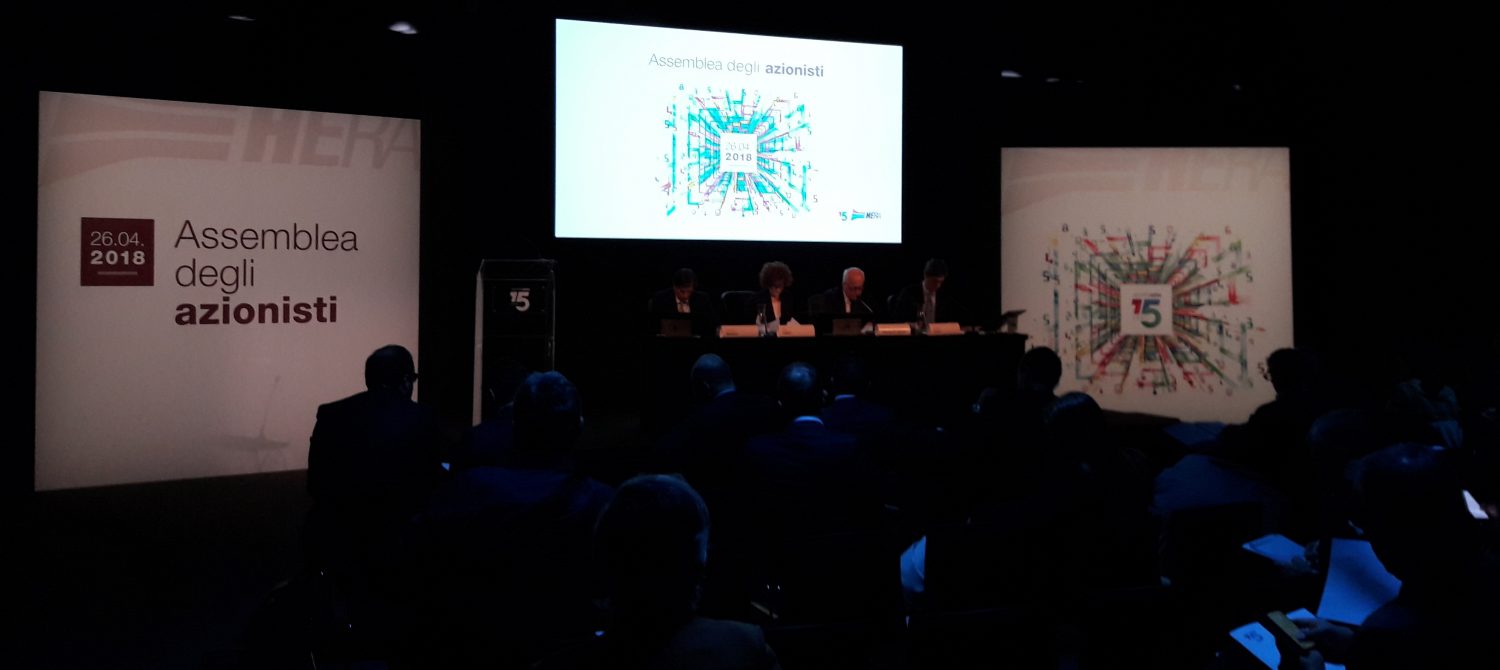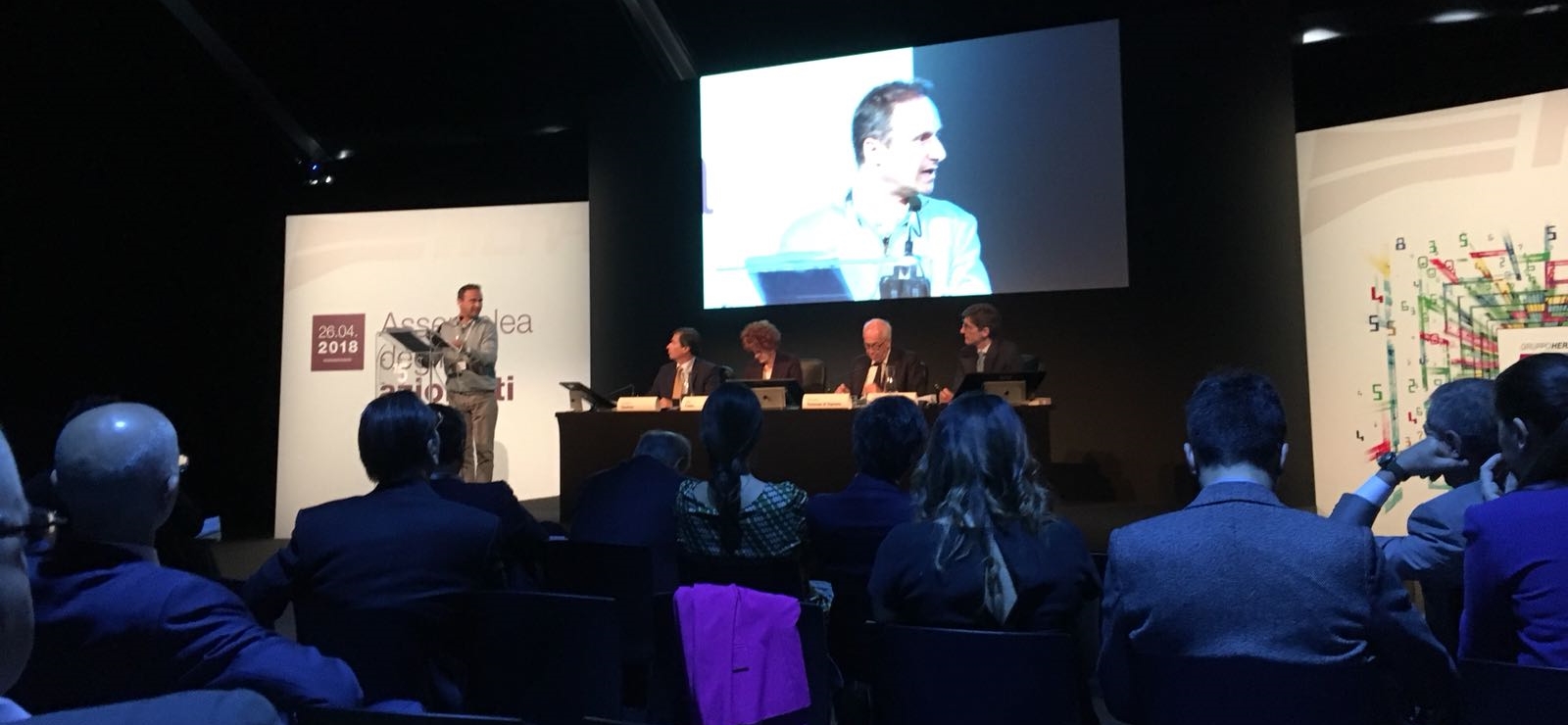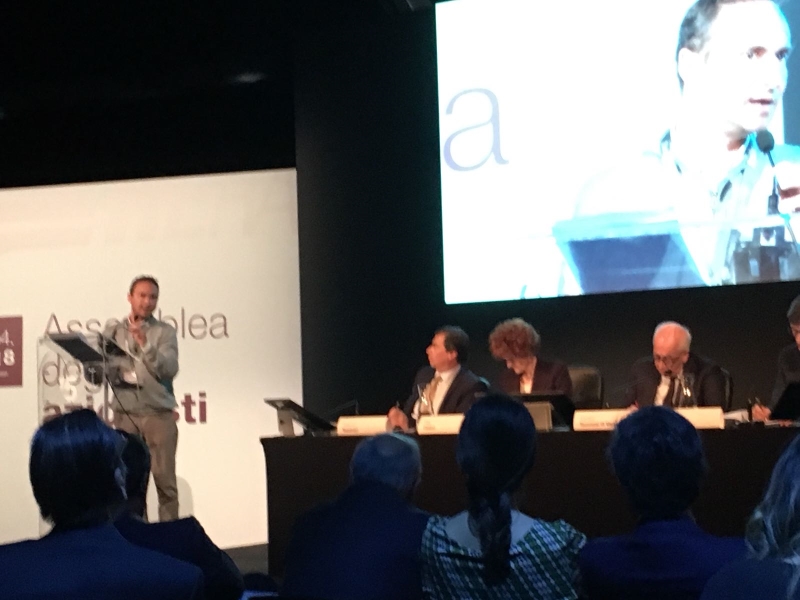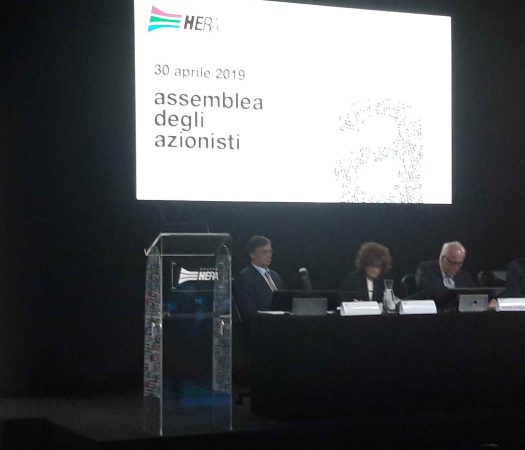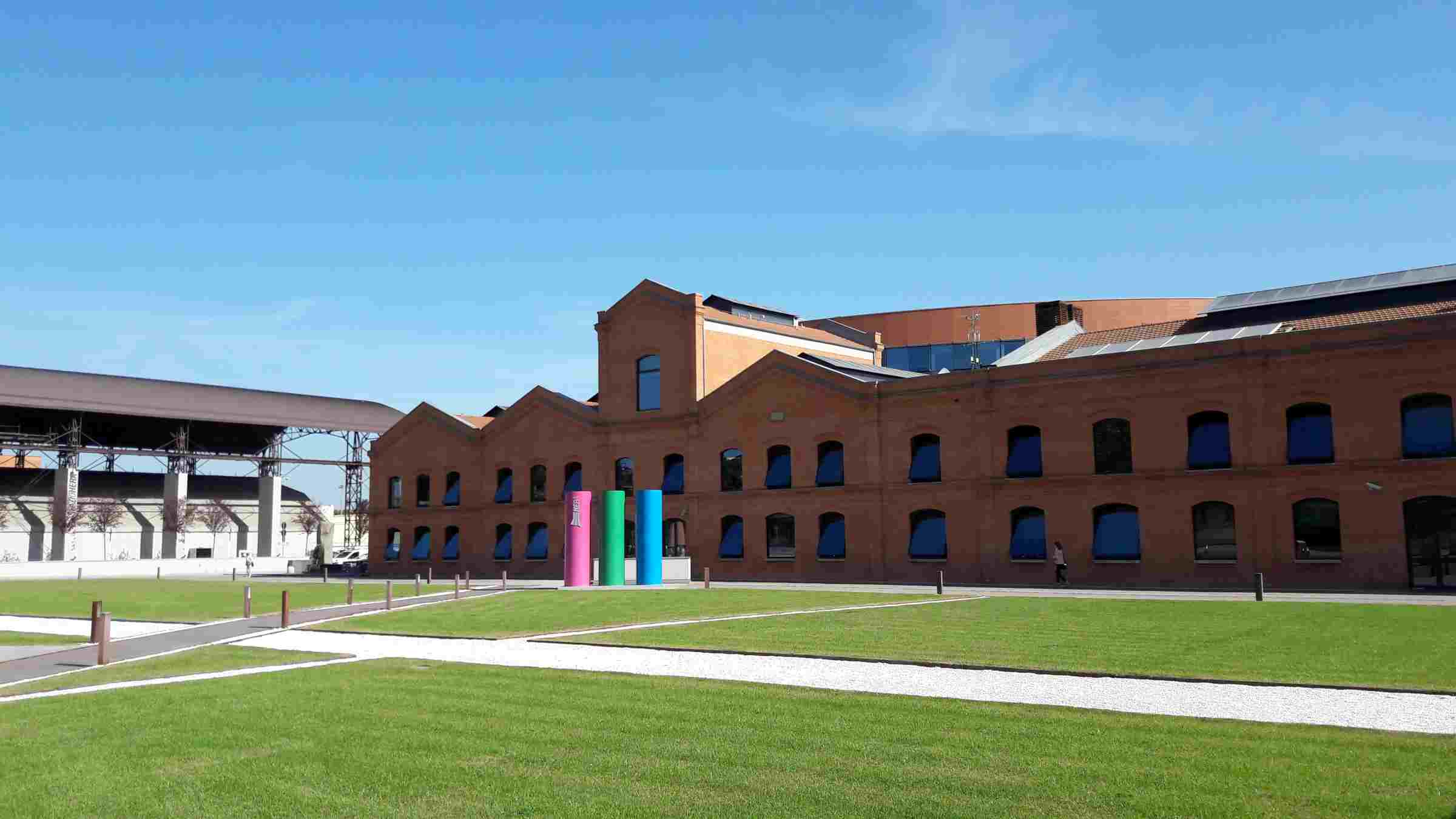
Shareholders’ Meeting of 26 April 2018
The shareholders are invited to take part in the Ordinary Shareholder’s Meeting at Hera S.p.A. headquarters at Viale C. Berti Pichat n. 2/4, Bologna, at “Spazio Hera”, on April 26, 2018 at 10.00 a.m. in a combined (ordinary and extraordinary) shareholders’ meeting to deliberate over the following:
Agenda
- Financial statement at December 31, 2016, annual report, proposal for profit distribution and report of the Board of Statutory Auditors and the Independent Auditors: resolutions pertaining thereto, and financial statements Consolidated financial statement at 31 December 2017 Report on Sustainability presentation – Consolidated non-financial statement developed in accordance with legislative decree n. 254/2016.
- Corporate governance presentation and non-binding decision regarding the interest rate policy.
- Treasury share acquisition authorization renewal and formalities disposition arrangements: inherent and consequent resolutions. 4. Appointment of new Board of Directors member. The full proposed resolutions text, as well as the illustrative reports and documents to be submitted to the Meeting are available to the public at the registered office and on the Company’s website (www.gruppohera.it), and also on the authorized website 1Info (www.1Info.it) within the statutory deadline set for each of the subjects discussed.
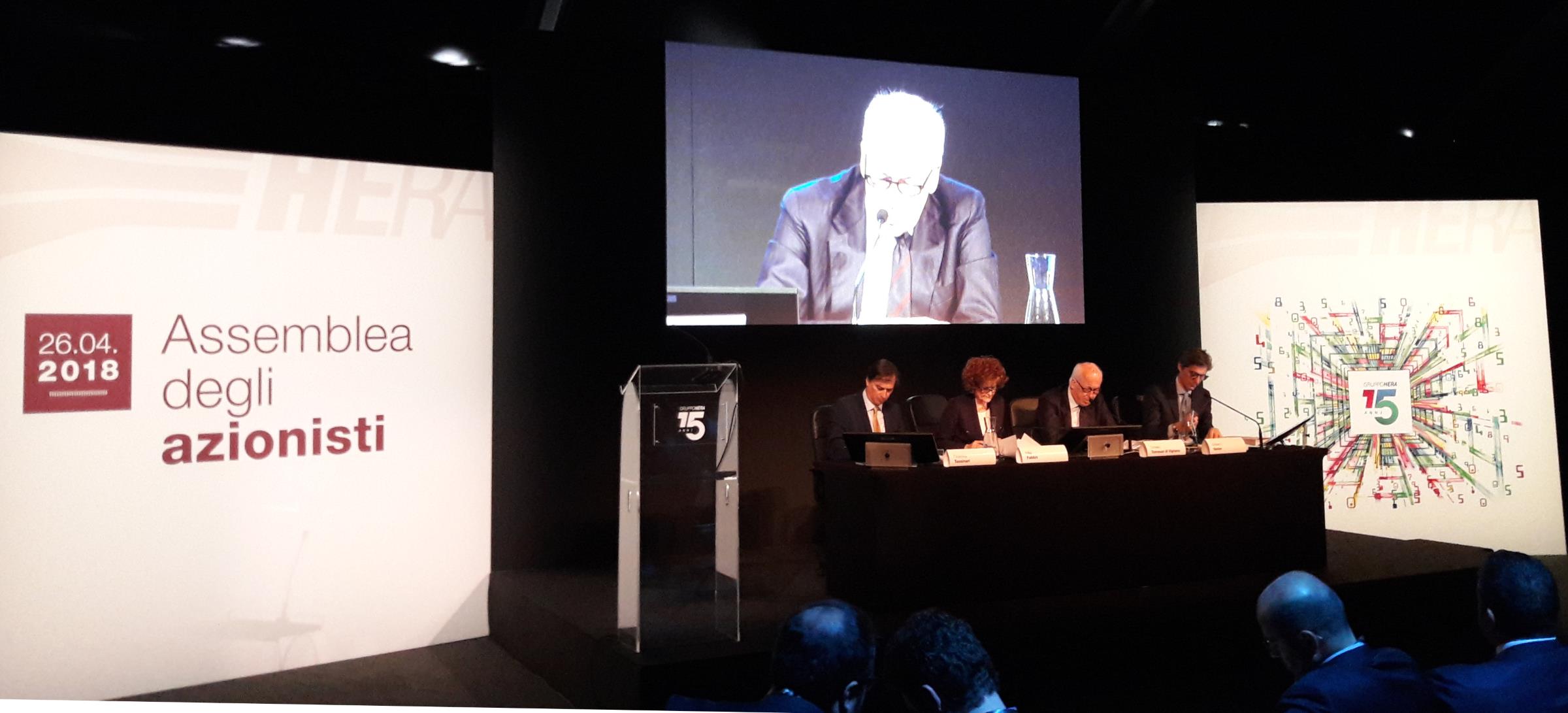
Agenda 1. Financial statement at December 31, 2016, annual report, proposal for profit distribution and report of the Board of Statutory Auditors and the Independent Auditors: resolutions pertaining thereto, and financial statements Consolidated financial statement at 31 December 2017 Report on Sustainability presentation – Consolidated non-financial statement developed in accordance with legislative decree n. 254/2016.
Statement of shareholder Nannetti, Enrico
Thank you, Mr. President. Good morning. I would like to share with you some comments as an investor, but also as a user and a citizen. User, as Hera takes care of us 24 hours a day, 365 days a year, and so I think it won’t cost us much if we take only a few minutes of our time to spend with Hera to learn more about its business. As a citizen, given the number of public administrators that are here, at this meeting, I take the opportunity to address the debate regarding environment and public services.
As in previous Meetings, I understand this first item in the Agenda in fact addresses to two issues that should be treated separately.
On the one hand, there is a report regarding the company’s ordinary activity. The judgment one does regarding this can only be positive, given that – at least from the outside – one has the feeling of dealing with an efficient company, i.e. that performs its tasks as quickly as the management board does.
On the other hand, at the same time, a decision regarding the proposal for profits share is needed.
Regarding this second and very distinctive issue, I must say I disagree. I think it is wiser to use such generated profit, in part, to repay the debt, in part, to reinvest in the production cycle. One reason is that the debt continues grow over impressive at around two thousand five hundred million of euro – what should be reduced. The second reason is the need to continue the path of vertical growth, through competence, already started with the acquisition of Aliplast.
We are moving towards a world that is increasingly characterized by “More State and Less Market”. This is seen at a global level where healthy and growing economies are those with an Entrepreneurial State model , such as China and Russia, with a supporting industry with strategic companies owned by a Sovereign Fund that issues sovereign currency – not borrowed from the private banking system (as Italy used to have with “Institute for Industrial Reconstruction” and the National Interest Banks partners of the Bank of Italy, before 1992 privatizing)… and at country level, where the winning political forces from the last elections are those favoring national interest, with an industrial policy oriented to the Country System common interest.
“More State and Less Market” means, for example, in the Northern League (Lega Nord) program, 50% tax reduction on waste by 2020 ( see Electoral Program, Waste Management, page 36 of 74).
The margins of simple public services distribution will be increasingly reduced to the bone. So I firmly support the decision to continue a growing path through competence, providing Hera with a second soul, with a second job, as a production company, better in Italy than abroad, for ex., of the following manufacturing sectors:
– planning and implementing of renewable gas production plants;
– planning and implementing of hydroelectric and wind energy production with innovative rotor-free blade technology;
– planning and implementing of hospital waste treatment on site;
– planning and implementing of automatic and mechanical waste selection.
Concluding: when the regular management does well, then there is full confidence in the Board of Directors. So, I say No to the distribution of profits, because I think it is better to tighten the belt a bit. I am personally convinced that it is more advantageous to aim for a return on capital invested as capital gain by reinvesting the profits partly on repaying the debt and partly in the process of growth through competence. (Personally, a decade ago, I bought shares at 2.4 euros stock price. The current stock price is of 3.10 euros. I’ve already achieved an increase of 25% in share price, despite the previous dividend distributions of about 100 million a year and interest payment of about 70-80 million a year. I’m convinced that by reducing the debt, reducing the dividends distribution and investing in capex to strengthen the soul of towards a manufacturing enterprise, the shares stock price can increase by making investments more profitable).
VOTE: AGAINST item 1 of the AGENDA.
I appreciate your time. Keep up with the good work.
Item 2 of the Agenda
Corporate governance presentation and non-binding decision regarding the interest rate policy.
Statement of shareholder Nannetti, Enrico
Thank you, Mr. President. I will take a few seconds to reply your observation in which you saw a lack of knowledge on behalf of the undersigned regarding the investments of the company in plant engineering, and the presence of automated mechanical selection plants in the Group. I would like to point out that I have full and up-to-date knowledge of the plant facilities located in the various plants, which among other things is the subject of constant comparative analysis with that of national and international competitors such as A2A from Lombardy, the Italian company Snam and the American company Waste Management, starting from the respective company sites. Particularly regarding Hera Group’s mechanical sorting plants, I’ve seen Stadler machinery in operation at Herambiente office in Via del Frullo, on the visit organized by Hera Group’s small shareholders’ association, in short, Actionhera, that I coordinate since 2011 (I take this opportunity to thank again for the welcome received from the plant managers and workers who guided us during this visit, as well as the Board of Directors represented by Forte Clò, and the Mayors of Granarolo Daniela Lo Conte di Minerbio, Lorenzo Minganti, who were available to answer our questions).
So, no one can argue that investments were not made: it is perfectly clear they were made and that, as said, “we didn’t pull the hand back” … But, the core question is how much? It is the quantitative level of investments that varies in substance; in what percentage on turnover is made from 0 to 100?
[Knowing that 100 is the content of 100 trucks transporting different kinds of plastic, about 50% is used for real recycling, thus, enabling plastic reuse. But the remaining, about 50% to date, is shredded as CDR (waste derived fuel) and burned into incinerators. So, when it is rumored that “we recover more than 94% of the different kinds of plastic”, it is not specified that the word “recovery” does not relate to a legal case, rather, it is merely a term that conceals the fact that a part is used for recycling and another is incinerated. Therefore, the advantage of focusing on automatic selection equipment that separates waste more efficiently is of two kinds:- citizens’ life is made easier with a single dumpster: the manager differentiates it a downstream, making the life of citizens much easier. Specially in big cities, not everyone neither has the space nor wants to keep garbage for a week. The American historical company Waste Management – with about 15 billion dollars turnover – has chosen, years ago, to use a single unsorted dumpster enabling waste sorting already on production lines. These are not completely automatic processes, as it would increase energetic costs. It favors, therefore, workforce employment.
- by not burning plastic, the environment is protected as well: if plastic is recycled more efficiently, therefore, less mixed waste is send at the incinerator. It’s important to remember that “it’s madness to burn plastic“: they form dioxins and furans and other harmful emissions that are partly filtered and do not go into the atmosphere through ashes, but still form and remain in the filtration system circuit (in the polyester filters sleeves, in the vanadium filter metallic mesh and wastewater from the washing towers) and scattered among blast furnace slag. The plastic burning pollutants do not vanish into thin air! Indeed, often the slugs containing polluting substances end up as components in concrete and bituminous agglomerates on the streets, which, in summer, are perhaps carelessly released into the atmosphere and we end up breathing such air.
So, the point is, if one upgrades equipment and facilities, reinvesting profits, probably the percentage of real recycling, now at around half, could increase. This applies to mechanical sorting plants for plastics, paper, but also for water purification plants, water reserves reservoirs for drought, to purge sewer pipes and all ordinary and extraordinary maintenance interventions possible when reinvesting profits. If you pay 200 million a year between interest to banks and dividends rather than reinvest it in self-financing, then it is clear that these things can be done to a much more limited extent….]*
The information in brackets [ ] I add here at “Verbale online” made available to the remaining 20.900 shareholders who could not take part in such debate because are at work or at home, but are aware of my arguments, considering that physically, in the Assembly, there is no material time to fully argue an agenda, receive the kind reply from the Board of Directors and reengage into the discussion, for time and organizational reasons. In my point of view, it is surreal to show, on a single Meeting, in a couple of hours, the company’s past year’s activities and those scheduled in the Business Plan – considering that this company has over 5 billion euros on investments, 8,500 employees and 4 business lines. It is a shame that only about 10 minutes is allowed for an intervention of the single shareholders. For this reason, as coordinator of Azionehera, I have personally promoted a new way of carrying out the Meetings, described at Azione 6: Sovranità.
I would like to say a few things about Corporate Governance, as it consists of three levers that interact with each other: Strategy, Market and People.
Strategy – I reaffirm the need of Hera to continue the growing through competence path, already started with the acquisition of Aliplast, building a supply chain technical expertise that supports the trade and commercial distribution of goods and services, those of a production company with activities in charge of a value-added chain, that can be sold both in Italy and abroad.
Market – recognize it has changed. Therefore, from a “More State and Less Market” perspective, it is possible to think in a cooperative solution between multiutilities such as A2A, ACEA, IREN and HERA, all of them with the same relative majority owner, the public entity, created by generating scale economies at zero costs, by centralizing purchasing offices, IT systems, research and development. Then, move from a competitive approach to a price war between users, in a cooperative approach aimed at generating a wider dimension, while, at the same time, maintaining an optimal territorial area for both approaches in its own reference territory, keeping, this way, for both, their own identity.
People – it is a matter of asking the property representatives, namely, the mayors, to give a hand to the Direction, actively takin part on the industrial policy decisions, both within the Company – providing guidelines that should be addressed to the collective interest – and from outside the Company – in the ANCI Associazione Nazionale dei Comuni Italiani (National Association of Italian Municipalities), Utilitalia, and the Government – to enabling the greatest innovation possible today: give the State back the prerogative of issuing money. Today, within the existing regulatory framework and without conflicting the Eurozone legislation, it is possible for the State to issue the necessary liquidity the system is currently lacking in order to develop public utility services and infrastructures.
[Azionehera is a founding member of the Associazione Moneta Positiva, a European network that has thoroughly studied the by-laws of the European Central Bank, Bank of Italy and Community Treaties Regulations. After years of study and public comparisons carried out by a working group led by engineer Fabio Conditi – along with the euro and not contrasting its legal discipline – monetary instruments were developed that can be issued by the State, in legal tenders (recognized as valid, as it can be used to pay taxes), as follows:
1. SIRE, namely, Tax Credit Certificates.
2. State tickets with legal tender, namely, banknotes like those of the 500 Lire of winged mercury, issued by the Italian Republic.
3. Coins for 5, 10 and 20 euros, because the euro is not a single currency, therefore, every European State issue its own euro amount, with a 1: 1 exchange ratio in relation to other states. In fact, on the back of the 1-euro coin, for Italy there is the man of Vitruvius, for Germany, the eagle, for Spain the effigy of the King, etc.
4. Electronic money issued by a State-owned bank. In fact, when the financial director of Hera Spa hires a financing line with a private bank, this, in turn, with a single mouse click, issues a loan … being able to lend only 1% of the total amount. But there is no gold to cover, there are no reserves … it is Fiat Money … money created ex nihil out of nowhere, with a computer click upon interest payment of about 3/4%. If such loan was made by State-owned Banks, to public, State-owned companies that provide public goods – for example, for networks restructuring or build renewable energy plants or even to finance post-earthquake reconstruction – there would be enough money available, without the need to pay any debt !!!:
Surely such a simple concept is not written on newspapers, magazines, neither spoken by the media nor the academic world, by professors nor unions, as it is, in fact, the fundamental stone, with which the financial market plays, for years, the game of making money without actually doing anything. The standard speech brings this narrative and the one who disagree are deemed stucked are not able to make a career. In short, please refer to the website Azionehera.it , where there are more details on how the State could actually help multiutility companies, like Hera, to finance themselves at zero costs, simply by issuing State money. I personally believe this is the innovation of innovations, the mother of all innovations, and it should be pursued by all citizens representatives who are as well, ownership representatives of investee companies.
This topic is absolutely linked to the Industrial Plan, and I think that the Shareholders’ Meeting is the natural place where a shareholder is allowed to speak, either as investor, user and citizen, facing their representatives: Hera Spa works with the environment, namely, the territory and social-economical relationships mentioned above. Therefore, the guidelines promoted by politics must be done after speaking with citizens.
Regarding remuneration, I’d simply like to remember that about 50% of the contracts in value are regulated (namely, public users, such as schools, hospitals, military facilities, etc.). Frequently, there is a semi-monopoly regime, and the revenues generated by the bills are based on the calculation of tariffs that provide 7% return on the invested capital, in concrete terms, on costs. The company’s profit is given by the difference between what one decides to charge on bills and how much one decides to invest in ordinary and extraordinary maintenance network – what, in my view, there is anything heroic about this, especially because it is not possible to see where the business risk is. I wonder if these considerations are considered when setting the parameters that define remuneration policies.
That’s why I firmly support the growth through competence path, under a production company model, with real market risks, to adjust the remuneration according to the results achieved, where profit is really an added value generated by goods and services produced in a real competitive business model. Regarding this issue, I entrust myself to the President’s politeness, to whom I renew my full confidence, even though I do not fully agree with a governance based on dimensional growth and dividends profit distribution policy – that the Municipalities do not always employ aligned with the institutional mission of the investee company that generated such profits.
VOTE: NON-VOTING regarding Item 2 of the AGENDA.
Note: during the voting statement under the electronic device RadioVoter, I pressed the button “X” for “against” but, mistakenly, didn’t press the OK for confirmation. So, I resulted, in fact, as “Non-Voting” despite willing to vote “against”. In fact, on one hand, I was sorry I couldn’t cast a vote for a minor mistake, as I believe, from a strategic point of view, corporate governance must correct the following route:
- stop dimensional growth under M&A, indeed reduction by selling assets;
- Focus on vertical growth through competence by acquiring goods and services production-oriented companies, either for its own supply chain or for competing on national and international market.
- Drastic reduction aiming pay the debt in 8 years through a series of precise executive actions (present on a list drawn by collaborator Enrico Nannetti), starting with the non-distribution of profits. If, on the one hand, I was sorry not to participate in the vote – among other things, I immediately asked the Presidential Table if it was possible to review it as soon as the President read my name as “Non-Voting”, even after already exposing my position as “contrary” vote to the previous vote statement. On the other hand, I felt partly relieved because the vote provided for an opinion on the attached Report on Remuneration, a report which, although I had read it, was incomprehensible to me: long-winded, lacking clear structural items. I wasn’t the only one who had such perception, as another shareholder asked for more clarification on what was about to be voted, immediately after the illustration demonstrated by the President, arguing, in fact, what has actually changed compared to previous data. The answer to his question seemed extremely synthetic, if not, vague. In short, it would have been better not to vote an AGENDA whose second item was incomprehensible to most shareholders.
